Evaluating Professional Practice and Development in Education Context
VerifiedAdded on 2023/06/05
|17
|6169
|355
Report
AI Summary
This report provides a comprehensive analysis of professional practice and development within the education and training sector. It defines professionalism and dual professionalism, explores the influence of professional values, and examines the impact of social, political, and economic factors on educational policy. The report also discusses the roles of stakeholders and external bodies, emphasizing accountability and partnership. Furthermore, it analyses the impact of current educational policies and organizational requirements on curriculum design, delivery, and assessment. The report concludes with an analysis of quality improvement and assurance arrangements, the function of self-assessment, and an evaluation of a learning program, identifying areas for improvement, contributing to a deeper understanding of effective educational practices.
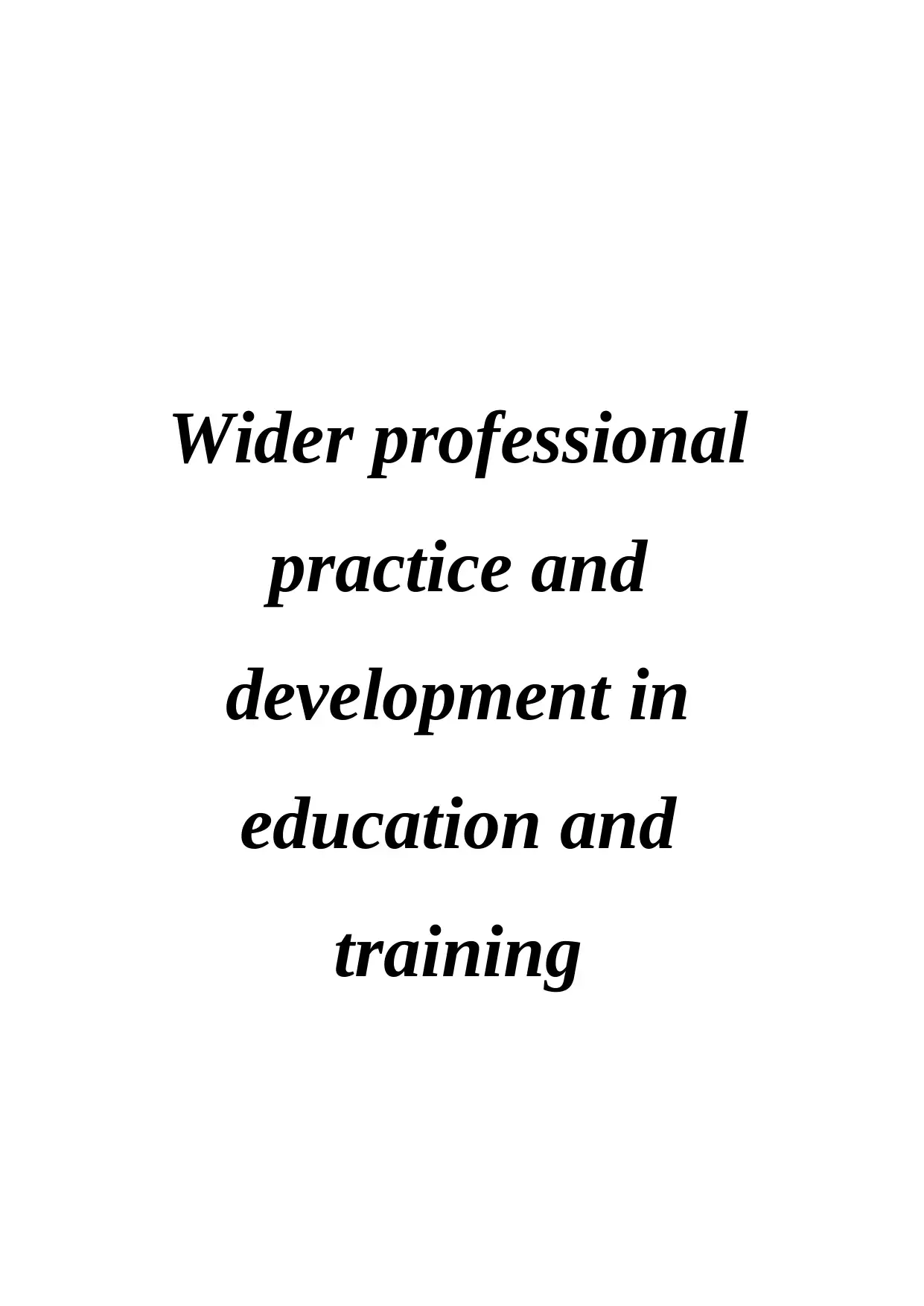
Wider professional
practice and
development in
education and
training
practice and
development in
education and
training
Paraphrase This Document
Need a fresh take? Get an instant paraphrase of this document with our AI Paraphraser
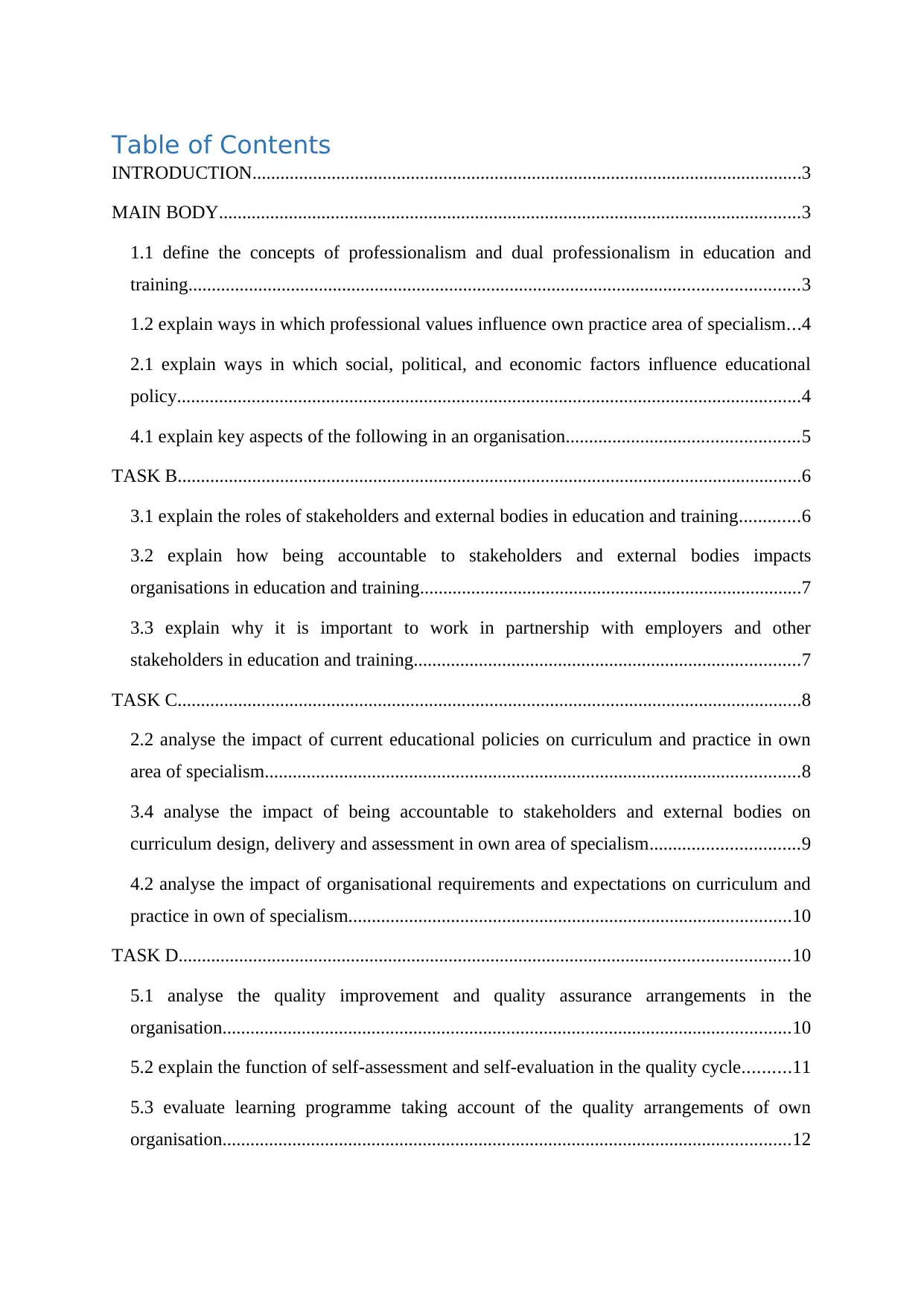
Table of Contents
INTRODUCTION......................................................................................................................3
MAIN BODY.............................................................................................................................3
1.1 define the concepts of professionalism and dual professionalism in education and
training...................................................................................................................................3
1.2 explain ways in which professional values influence own practice area of specialism...4
2.1 explain ways in which social, political, and economic factors influence educational
policy......................................................................................................................................4
4.1 explain key aspects of the following in an organisation..................................................5
TASK B......................................................................................................................................6
3.1 explain the roles of stakeholders and external bodies in education and training.............6
3.2 explain how being accountable to stakeholders and external bodies impacts
organisations in education and training..................................................................................7
3.3 explain why it is important to work in partnership with employers and other
stakeholders in education and training...................................................................................7
TASK C......................................................................................................................................8
2.2 analyse the impact of current educational policies on curriculum and practice in own
area of specialism...................................................................................................................8
3.4 analyse the impact of being accountable to stakeholders and external bodies on
curriculum design, delivery and assessment in own area of specialism................................9
4.2 analyse the impact of organisational requirements and expectations on curriculum and
practice in own of specialism...............................................................................................10
TASK D...................................................................................................................................10
5.1 analyse the quality improvement and quality assurance arrangements in the
organisation..........................................................................................................................10
5.2 explain the function of self-assessment and self-evaluation in the quality cycle..........11
5.3 evaluate learning programme taking account of the quality arrangements of own
organisation..........................................................................................................................12
INTRODUCTION......................................................................................................................3
MAIN BODY.............................................................................................................................3
1.1 define the concepts of professionalism and dual professionalism in education and
training...................................................................................................................................3
1.2 explain ways in which professional values influence own practice area of specialism...4
2.1 explain ways in which social, political, and economic factors influence educational
policy......................................................................................................................................4
4.1 explain key aspects of the following in an organisation..................................................5
TASK B......................................................................................................................................6
3.1 explain the roles of stakeholders and external bodies in education and training.............6
3.2 explain how being accountable to stakeholders and external bodies impacts
organisations in education and training..................................................................................7
3.3 explain why it is important to work in partnership with employers and other
stakeholders in education and training...................................................................................7
TASK C......................................................................................................................................8
2.2 analyse the impact of current educational policies on curriculum and practice in own
area of specialism...................................................................................................................8
3.4 analyse the impact of being accountable to stakeholders and external bodies on
curriculum design, delivery and assessment in own area of specialism................................9
4.2 analyse the impact of organisational requirements and expectations on curriculum and
practice in own of specialism...............................................................................................10
TASK D...................................................................................................................................10
5.1 analyse the quality improvement and quality assurance arrangements in the
organisation..........................................................................................................................10
5.2 explain the function of self-assessment and self-evaluation in the quality cycle..........11
5.3 evaluate learning programme taking account of the quality arrangements of own
organisation..........................................................................................................................12
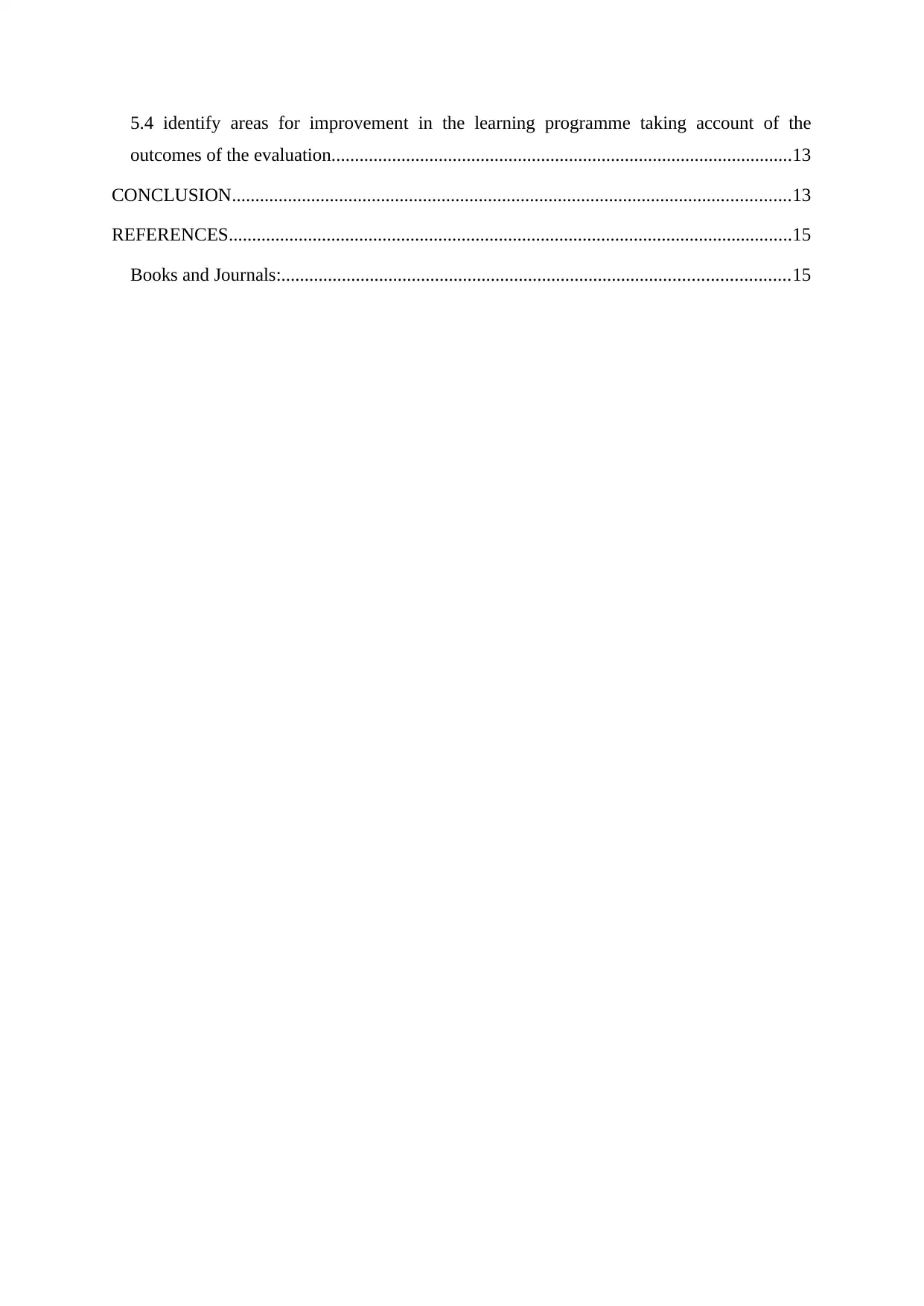
5.4 identify areas for improvement in the learning programme taking account of the
outcomes of the evaluation...................................................................................................13
CONCLUSION........................................................................................................................13
REFERENCES.........................................................................................................................15
Books and Journals:.............................................................................................................15
outcomes of the evaluation...................................................................................................13
CONCLUSION........................................................................................................................13
REFERENCES.........................................................................................................................15
Books and Journals:.............................................................................................................15
⊘ This is a preview!⊘
Do you want full access?
Subscribe today to unlock all pages.

Trusted by 1+ million students worldwide
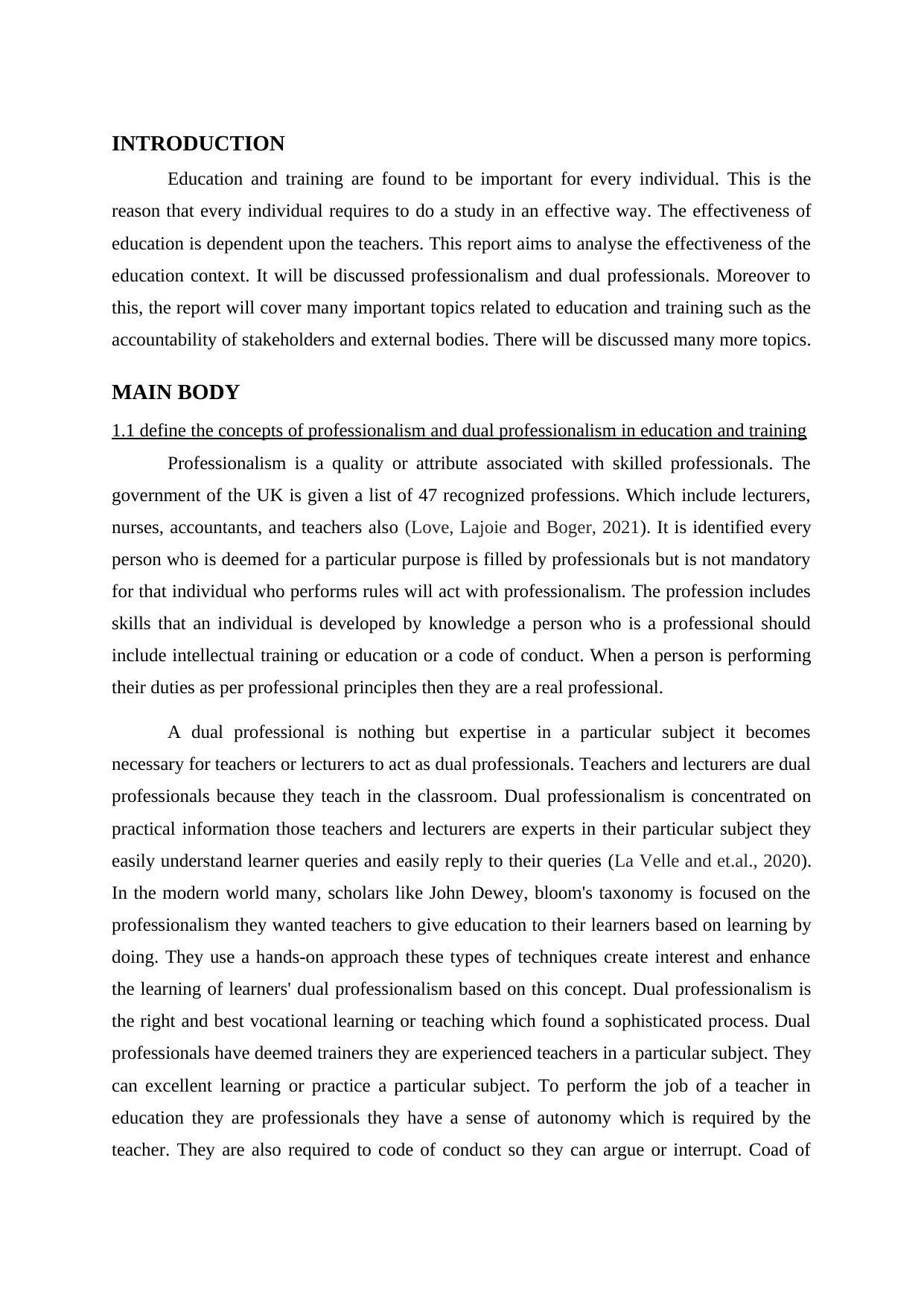
INTRODUCTION
Education and training are found to be important for every individual. This is the
reason that every individual requires to do a study in an effective way. The effectiveness of
education is dependent upon the teachers. This report aims to analyse the effectiveness of the
education context. It will be discussed professionalism and dual professionals. Moreover to
this, the report will cover many important topics related to education and training such as the
accountability of stakeholders and external bodies. There will be discussed many more topics.
MAIN BODY
1.1 define the concepts of professionalism and dual professionalism in education and training
Professionalism is a quality or attribute associated with skilled professionals. The
government of the UK is given a list of 47 recognized professions. Which include lecturers,
nurses, accountants, and teachers also (Love, Lajoie and Boger, 2021). It is identified every
person who is deemed for a particular purpose is filled by professionals but is not mandatory
for that individual who performs rules will act with professionalism. The profession includes
skills that an individual is developed by knowledge a person who is a professional should
include intellectual training or education or a code of conduct. When a person is performing
their duties as per professional principles then they are a real professional.
A dual professional is nothing but expertise in a particular subject it becomes
necessary for teachers or lecturers to act as dual professionals. Teachers and lecturers are dual
professionals because they teach in the classroom. Dual professionalism is concentrated on
practical information those teachers and lecturers are experts in their particular subject they
easily understand learner queries and easily reply to their queries (La Velle and et.al., 2020).
In the modern world many, scholars like John Dewey, bloom's taxonomy is focused on the
professionalism they wanted teachers to give education to their learners based on learning by
doing. They use a hands-on approach these types of techniques create interest and enhance
the learning of learners' dual professionalism based on this concept. Dual professionalism is
the right and best vocational learning or teaching which found a sophisticated process. Dual
professionals have deemed trainers they are experienced teachers in a particular subject. They
can excellent learning or practice a particular subject. To perform the job of a teacher in
education they are professionals they have a sense of autonomy which is required by the
teacher. They are also required to code of conduct so they can argue or interrupt. Coad of
Education and training are found to be important for every individual. This is the
reason that every individual requires to do a study in an effective way. The effectiveness of
education is dependent upon the teachers. This report aims to analyse the effectiveness of the
education context. It will be discussed professionalism and dual professionals. Moreover to
this, the report will cover many important topics related to education and training such as the
accountability of stakeholders and external bodies. There will be discussed many more topics.
MAIN BODY
1.1 define the concepts of professionalism and dual professionalism in education and training
Professionalism is a quality or attribute associated with skilled professionals. The
government of the UK is given a list of 47 recognized professions. Which include lecturers,
nurses, accountants, and teachers also (Love, Lajoie and Boger, 2021). It is identified every
person who is deemed for a particular purpose is filled by professionals but is not mandatory
for that individual who performs rules will act with professionalism. The profession includes
skills that an individual is developed by knowledge a person who is a professional should
include intellectual training or education or a code of conduct. When a person is performing
their duties as per professional principles then they are a real professional.
A dual professional is nothing but expertise in a particular subject it becomes
necessary for teachers or lecturers to act as dual professionals. Teachers and lecturers are dual
professionals because they teach in the classroom. Dual professionalism is concentrated on
practical information those teachers and lecturers are experts in their particular subject they
easily understand learner queries and easily reply to their queries (La Velle and et.al., 2020).
In the modern world many, scholars like John Dewey, bloom's taxonomy is focused on the
professionalism they wanted teachers to give education to their learners based on learning by
doing. They use a hands-on approach these types of techniques create interest and enhance
the learning of learners' dual professionalism based on this concept. Dual professionalism is
the right and best vocational learning or teaching which found a sophisticated process. Dual
professionals have deemed trainers they are experienced teachers in a particular subject. They
can excellent learning or practice a particular subject. To perform the job of a teacher in
education they are professionals they have a sense of autonomy which is required by the
teacher. They are also required to code of conduct so they can argue or interrupt. Coad of
Paraphrase This Document
Need a fresh take? Get an instant paraphrase of this document with our AI Paraphraser
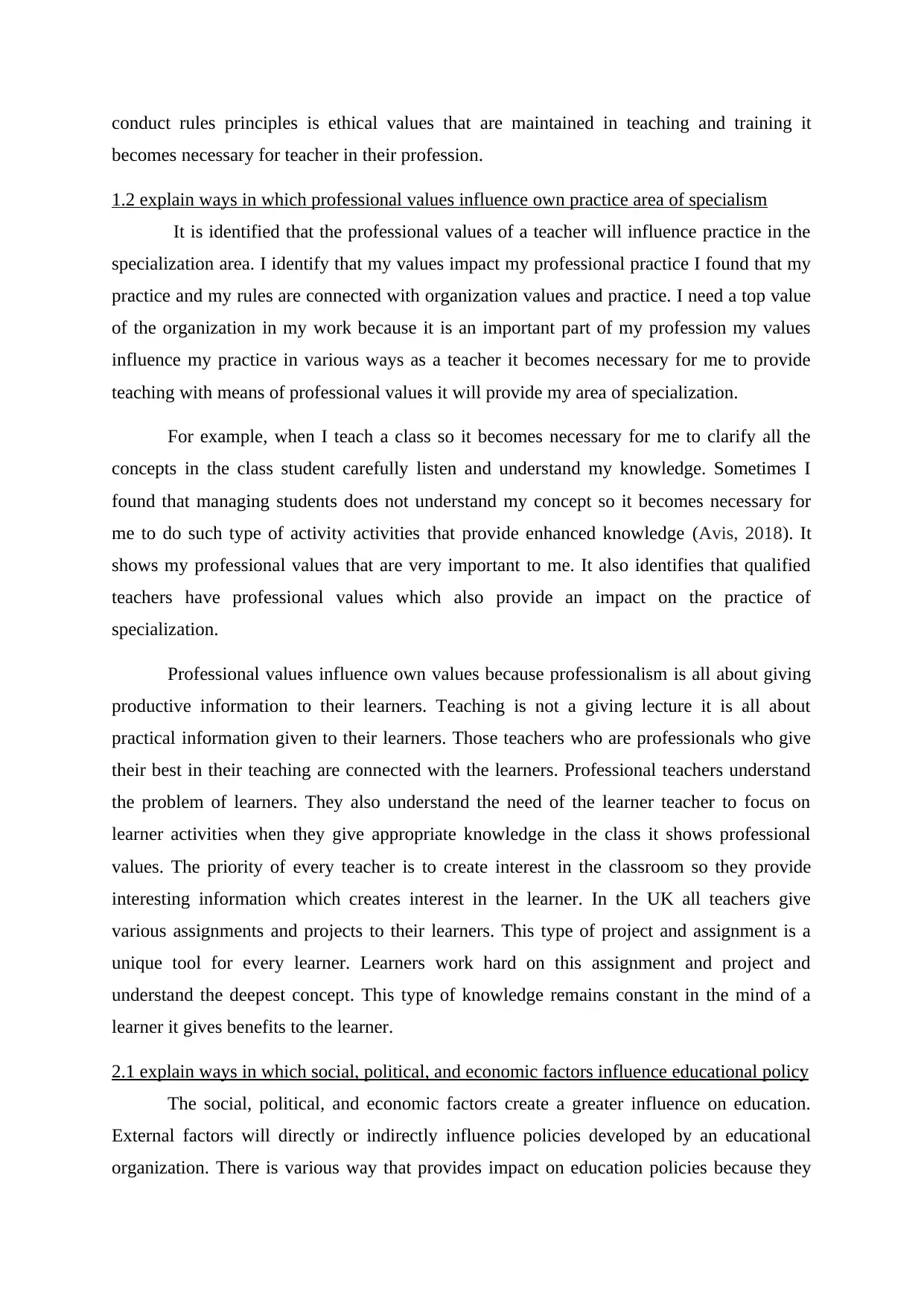
conduct rules principles is ethical values that are maintained in teaching and training it
becomes necessary for teacher in their profession.
1.2 explain ways in which professional values influence own practice area of specialism
It is identified that the professional values of a teacher will influence practice in the
specialization area. I identify that my values impact my professional practice I found that my
practice and my rules are connected with organization values and practice. I need a top value
of the organization in my work because it is an important part of my profession my values
influence my practice in various ways as a teacher it becomes necessary for me to provide
teaching with means of professional values it will provide my area of specialization.
For example, when I teach a class so it becomes necessary for me to clarify all the
concepts in the class student carefully listen and understand my knowledge. Sometimes I
found that managing students does not understand my concept so it becomes necessary for
me to do such type of activity activities that provide enhanced knowledge (Avis, 2018). It
shows my professional values that are very important to me. It also identifies that qualified
teachers have professional values which also provide an impact on the practice of
specialization.
Professional values influence own values because professionalism is all about giving
productive information to their learners. Teaching is not a giving lecture it is all about
practical information given to their learners. Those teachers who are professionals who give
their best in their teaching are connected with the learners. Professional teachers understand
the problem of learners. They also understand the need of the learner teacher to focus on
learner activities when they give appropriate knowledge in the class it shows professional
values. The priority of every teacher is to create interest in the classroom so they provide
interesting information which creates interest in the learner. In the UK all teachers give
various assignments and projects to their learners. This type of project and assignment is a
unique tool for every learner. Learners work hard on this assignment and project and
understand the deepest concept. This type of knowledge remains constant in the mind of a
learner it gives benefits to the learner.
2.1 explain ways in which social, political, and economic factors influence educational policy
The social, political, and economic factors create a greater influence on education.
External factors will directly or indirectly influence policies developed by an educational
organization. There is various way that provides impact on education policies because they
becomes necessary for teacher in their profession.
1.2 explain ways in which professional values influence own practice area of specialism
It is identified that the professional values of a teacher will influence practice in the
specialization area. I identify that my values impact my professional practice I found that my
practice and my rules are connected with organization values and practice. I need a top value
of the organization in my work because it is an important part of my profession my values
influence my practice in various ways as a teacher it becomes necessary for me to provide
teaching with means of professional values it will provide my area of specialization.
For example, when I teach a class so it becomes necessary for me to clarify all the
concepts in the class student carefully listen and understand my knowledge. Sometimes I
found that managing students does not understand my concept so it becomes necessary for
me to do such type of activity activities that provide enhanced knowledge (Avis, 2018). It
shows my professional values that are very important to me. It also identifies that qualified
teachers have professional values which also provide an impact on the practice of
specialization.
Professional values influence own values because professionalism is all about giving
productive information to their learners. Teaching is not a giving lecture it is all about
practical information given to their learners. Those teachers who are professionals who give
their best in their teaching are connected with the learners. Professional teachers understand
the problem of learners. They also understand the need of the learner teacher to focus on
learner activities when they give appropriate knowledge in the class it shows professional
values. The priority of every teacher is to create interest in the classroom so they provide
interesting information which creates interest in the learner. In the UK all teachers give
various assignments and projects to their learners. This type of project and assignment is a
unique tool for every learner. Learners work hard on this assignment and project and
understand the deepest concept. This type of knowledge remains constant in the mind of a
learner it gives benefits to the learner.
2.1 explain ways in which social, political, and economic factors influence educational policy
The social, political, and economic factors create a greater influence on education.
External factors will directly or indirectly influence policies developed by an educational
organization. There is various way that provides impact on education policies because they
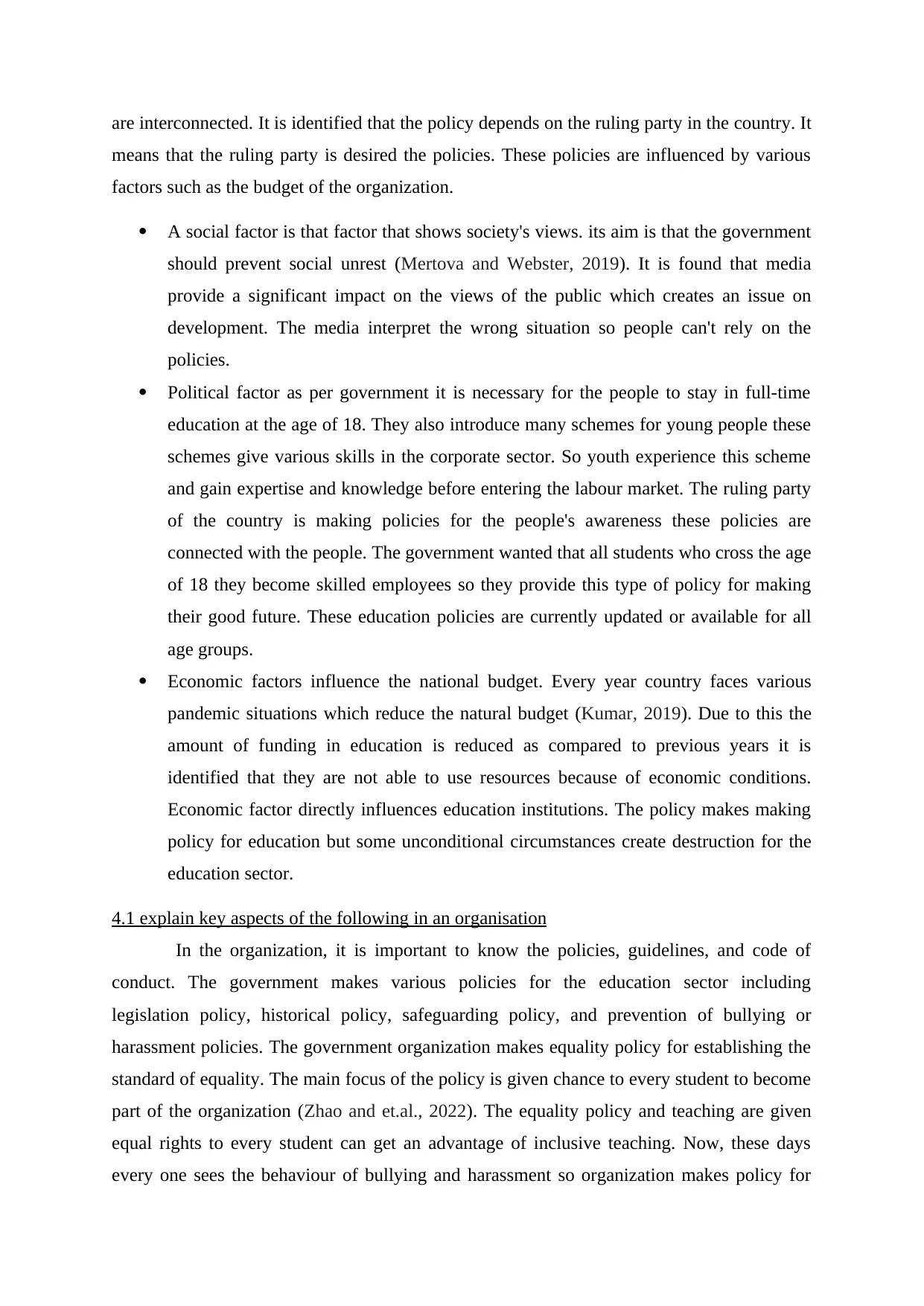
are interconnected. It is identified that the policy depends on the ruling party in the country. It
means that the ruling party is desired the policies. These policies are influenced by various
factors such as the budget of the organization.
A social factor is that factor that shows society's views. its aim is that the government
should prevent social unrest (Mertova and Webster, 2019). It is found that media
provide a significant impact on the views of the public which creates an issue on
development. The media interpret the wrong situation so people can't rely on the
policies.
Political factor as per government it is necessary for the people to stay in full-time
education at the age of 18. They also introduce many schemes for young people these
schemes give various skills in the corporate sector. So youth experience this scheme
and gain expertise and knowledge before entering the labour market. The ruling party
of the country is making policies for the people's awareness these policies are
connected with the people. The government wanted that all students who cross the age
of 18 they become skilled employees so they provide this type of policy for making
their good future. These education policies are currently updated or available for all
age groups.
Economic factors influence the national budget. Every year country faces various
pandemic situations which reduce the natural budget (Kumar, 2019). Due to this the
amount of funding in education is reduced as compared to previous years it is
identified that they are not able to use resources because of economic conditions.
Economic factor directly influences education institutions. The policy makes making
policy for education but some unconditional circumstances create destruction for the
education sector.
4.1 explain key aspects of the following in an organisation
In the organization, it is important to know the policies, guidelines, and code of
conduct. The government makes various policies for the education sector including
legislation policy, historical policy, safeguarding policy, and prevention of bullying or
harassment policies. The government organization makes equality policy for establishing the
standard of equality. The main focus of the policy is given chance to every student to become
part of the organization (Zhao and et.al., 2022). The equality policy and teaching are given
equal rights to every student can get an advantage of inclusive teaching. Now, these days
every one sees the behaviour of bullying and harassment so organization makes policy for
means that the ruling party is desired the policies. These policies are influenced by various
factors such as the budget of the organization.
A social factor is that factor that shows society's views. its aim is that the government
should prevent social unrest (Mertova and Webster, 2019). It is found that media
provide a significant impact on the views of the public which creates an issue on
development. The media interpret the wrong situation so people can't rely on the
policies.
Political factor as per government it is necessary for the people to stay in full-time
education at the age of 18. They also introduce many schemes for young people these
schemes give various skills in the corporate sector. So youth experience this scheme
and gain expertise and knowledge before entering the labour market. The ruling party
of the country is making policies for the people's awareness these policies are
connected with the people. The government wanted that all students who cross the age
of 18 they become skilled employees so they provide this type of policy for making
their good future. These education policies are currently updated or available for all
age groups.
Economic factors influence the national budget. Every year country faces various
pandemic situations which reduce the natural budget (Kumar, 2019). Due to this the
amount of funding in education is reduced as compared to previous years it is
identified that they are not able to use resources because of economic conditions.
Economic factor directly influences education institutions. The policy makes making
policy for education but some unconditional circumstances create destruction for the
education sector.
4.1 explain key aspects of the following in an organisation
In the organization, it is important to know the policies, guidelines, and code of
conduct. The government makes various policies for the education sector including
legislation policy, historical policy, safeguarding policy, and prevention of bullying or
harassment policies. The government organization makes equality policy for establishing the
standard of equality. The main focus of the policy is given chance to every student to become
part of the organization (Zhao and et.al., 2022). The equality policy and teaching are given
equal rights to every student can get an advantage of inclusive teaching. Now, these days
every one sees the behaviour of bullying and harassment so organization makes policy for
⊘ This is a preview!⊘
Do you want full access?
Subscribe today to unlock all pages.

Trusted by 1+ million students worldwide
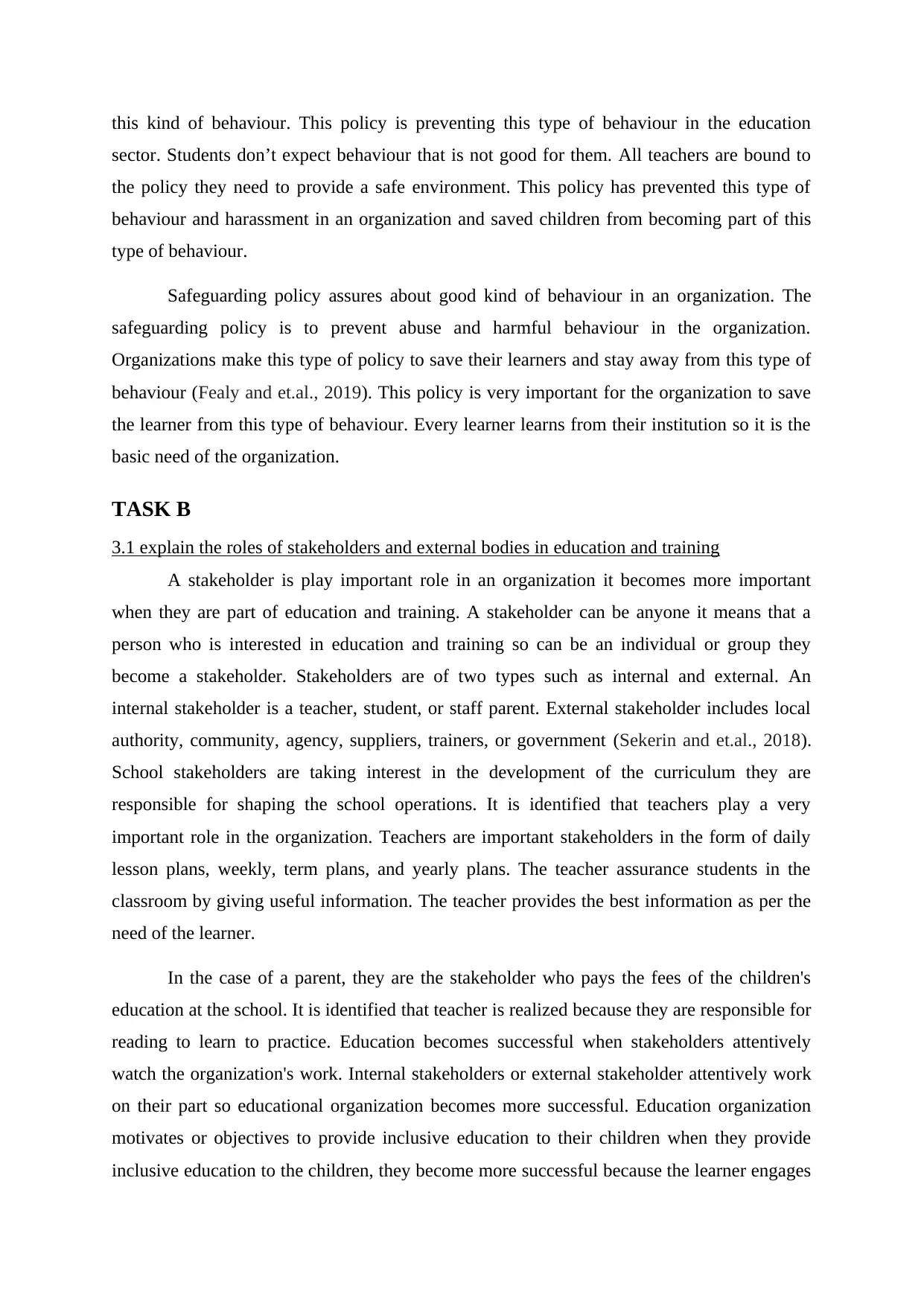
this kind of behaviour. This policy is preventing this type of behaviour in the education
sector. Students don’t expect behaviour that is not good for them. All teachers are bound to
the policy they need to provide a safe environment. This policy has prevented this type of
behaviour and harassment in an organization and saved children from becoming part of this
type of behaviour.
Safeguarding policy assures about good kind of behaviour in an organization. The
safeguarding policy is to prevent abuse and harmful behaviour in the organization.
Organizations make this type of policy to save their learners and stay away from this type of
behaviour (Fealy and et.al., 2019). This policy is very important for the organization to save
the learner from this type of behaviour. Every learner learns from their institution so it is the
basic need of the organization.
TASK B
3.1 explain the roles of stakeholders and external bodies in education and training
A stakeholder is play important role in an organization it becomes more important
when they are part of education and training. A stakeholder can be anyone it means that a
person who is interested in education and training so can be an individual or group they
become a stakeholder. Stakeholders are of two types such as internal and external. An
internal stakeholder is a teacher, student, or staff parent. External stakeholder includes local
authority, community, agency, suppliers, trainers, or government (Sekerin and et.al., 2018).
School stakeholders are taking interest in the development of the curriculum they are
responsible for shaping the school operations. It is identified that teachers play a very
important role in the organization. Teachers are important stakeholders in the form of daily
lesson plans, weekly, term plans, and yearly plans. The teacher assurance students in the
classroom by giving useful information. The teacher provides the best information as per the
need of the learner.
In the case of a parent, they are the stakeholder who pays the fees of the children's
education at the school. It is identified that teacher is realized because they are responsible for
reading to learn to practice. Education becomes successful when stakeholders attentively
watch the organization's work. Internal stakeholders or external stakeholder attentively work
on their part so educational organization becomes more successful. Education organization
motivates or objectives to provide inclusive education to their children when they provide
inclusive education to the children, they become more successful because the learner engages
sector. Students don’t expect behaviour that is not good for them. All teachers are bound to
the policy they need to provide a safe environment. This policy has prevented this type of
behaviour and harassment in an organization and saved children from becoming part of this
type of behaviour.
Safeguarding policy assures about good kind of behaviour in an organization. The
safeguarding policy is to prevent abuse and harmful behaviour in the organization.
Organizations make this type of policy to save their learners and stay away from this type of
behaviour (Fealy and et.al., 2019). This policy is very important for the organization to save
the learner from this type of behaviour. Every learner learns from their institution so it is the
basic need of the organization.
TASK B
3.1 explain the roles of stakeholders and external bodies in education and training
A stakeholder is play important role in an organization it becomes more important
when they are part of education and training. A stakeholder can be anyone it means that a
person who is interested in education and training so can be an individual or group they
become a stakeholder. Stakeholders are of two types such as internal and external. An
internal stakeholder is a teacher, student, or staff parent. External stakeholder includes local
authority, community, agency, suppliers, trainers, or government (Sekerin and et.al., 2018).
School stakeholders are taking interest in the development of the curriculum they are
responsible for shaping the school operations. It is identified that teachers play a very
important role in the organization. Teachers are important stakeholders in the form of daily
lesson plans, weekly, term plans, and yearly plans. The teacher assurance students in the
classroom by giving useful information. The teacher provides the best information as per the
need of the learner.
In the case of a parent, they are the stakeholder who pays the fees of the children's
education at the school. It is identified that teacher is realized because they are responsible for
reading to learn to practice. Education becomes successful when stakeholders attentively
watch the organization's work. Internal stakeholders or external stakeholder attentively work
on their part so educational organization becomes more successful. Education organization
motivates or objectives to provide inclusive education to their children when they provide
inclusive education to the children, they become more successful because the learner engages
Paraphrase This Document
Need a fresh take? Get an instant paraphrase of this document with our AI Paraphraser
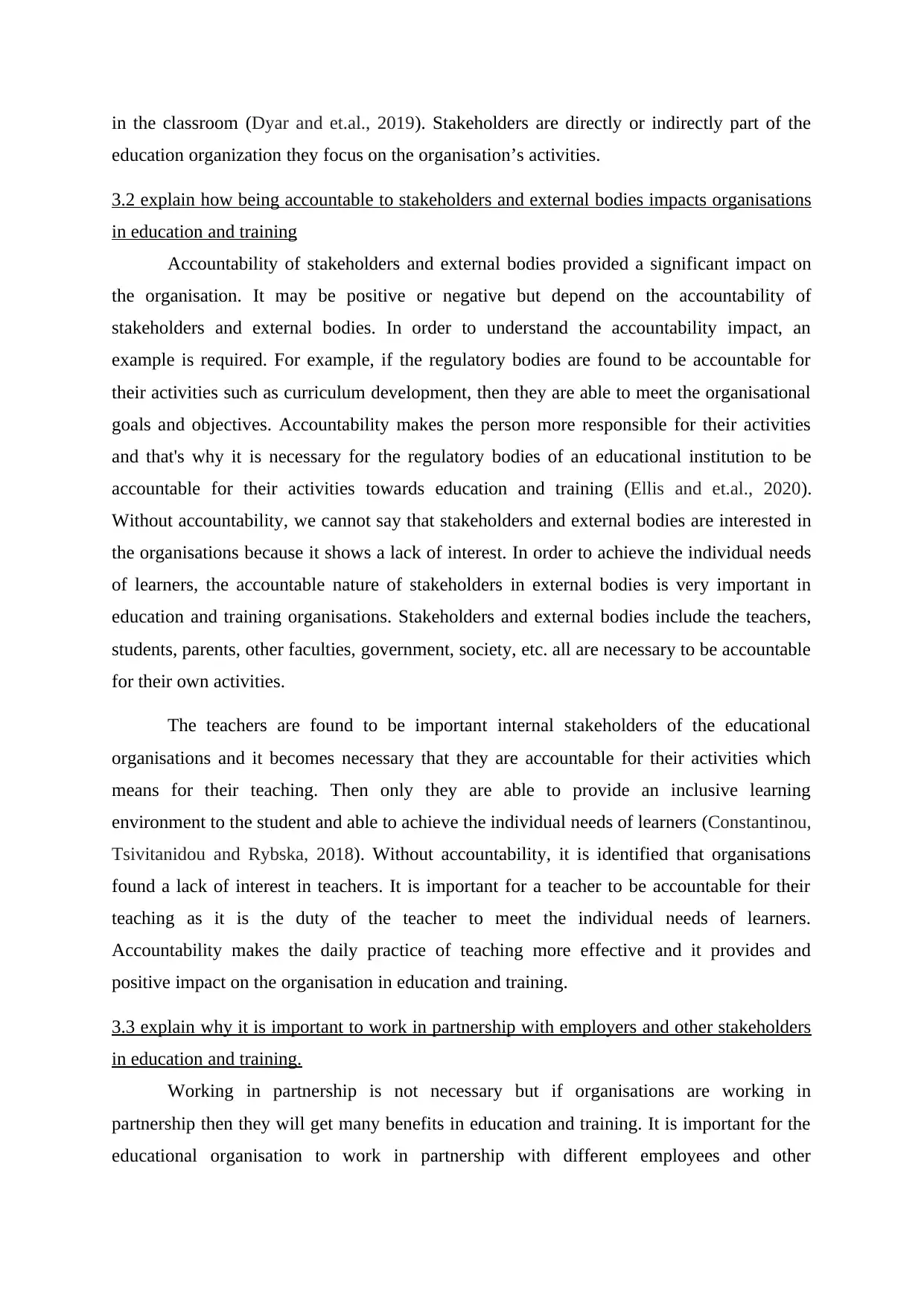
in the classroom (Dyar and et.al., 2019). Stakeholders are directly or indirectly part of the
education organization they focus on the organisation’s activities.
3.2 explain how being accountable to stakeholders and external bodies impacts organisations
in education and training
Accountability of stakeholders and external bodies provided a significant impact on
the organisation. It may be positive or negative but depend on the accountability of
stakeholders and external bodies. In order to understand the accountability impact, an
example is required. For example, if the regulatory bodies are found to be accountable for
their activities such as curriculum development, then they are able to meet the organisational
goals and objectives. Accountability makes the person more responsible for their activities
and that's why it is necessary for the regulatory bodies of an educational institution to be
accountable for their activities towards education and training (Ellis and et.al., 2020).
Without accountability, we cannot say that stakeholders and external bodies are interested in
the organisations because it shows a lack of interest. In order to achieve the individual needs
of learners, the accountable nature of stakeholders in external bodies is very important in
education and training organisations. Stakeholders and external bodies include the teachers,
students, parents, other faculties, government, society, etc. all are necessary to be accountable
for their own activities.
The teachers are found to be important internal stakeholders of the educational
organisations and it becomes necessary that they are accountable for their activities which
means for their teaching. Then only they are able to provide an inclusive learning
environment to the student and able to achieve the individual needs of learners (Constantinou,
Tsivitanidou and Rybska, 2018). Without accountability, it is identified that organisations
found a lack of interest in teachers. It is important for a teacher to be accountable for their
teaching as it is the duty of the teacher to meet the individual needs of learners.
Accountability makes the daily practice of teaching more effective and it provides and
positive impact on the organisation in education and training.
3.3 explain why it is important to work in partnership with employers and other stakeholders
in education and training.
Working in partnership is not necessary but if organisations are working in
partnership then they will get many benefits in education and training. It is important for the
educational organisation to work in partnership with different employees and other
education organization they focus on the organisation’s activities.
3.2 explain how being accountable to stakeholders and external bodies impacts organisations
in education and training
Accountability of stakeholders and external bodies provided a significant impact on
the organisation. It may be positive or negative but depend on the accountability of
stakeholders and external bodies. In order to understand the accountability impact, an
example is required. For example, if the regulatory bodies are found to be accountable for
their activities such as curriculum development, then they are able to meet the organisational
goals and objectives. Accountability makes the person more responsible for their activities
and that's why it is necessary for the regulatory bodies of an educational institution to be
accountable for their activities towards education and training (Ellis and et.al., 2020).
Without accountability, we cannot say that stakeholders and external bodies are interested in
the organisations because it shows a lack of interest. In order to achieve the individual needs
of learners, the accountable nature of stakeholders in external bodies is very important in
education and training organisations. Stakeholders and external bodies include the teachers,
students, parents, other faculties, government, society, etc. all are necessary to be accountable
for their own activities.
The teachers are found to be important internal stakeholders of the educational
organisations and it becomes necessary that they are accountable for their activities which
means for their teaching. Then only they are able to provide an inclusive learning
environment to the student and able to achieve the individual needs of learners (Constantinou,
Tsivitanidou and Rybska, 2018). Without accountability, it is identified that organisations
found a lack of interest in teachers. It is important for a teacher to be accountable for their
teaching as it is the duty of the teacher to meet the individual needs of learners.
Accountability makes the daily practice of teaching more effective and it provides and
positive impact on the organisation in education and training.
3.3 explain why it is important to work in partnership with employers and other stakeholders
in education and training.
Working in partnership is not necessary but if organisations are working in
partnership then they will get many benefits in education and training. It is important for the
educational organisation to work in partnership with different employees and other
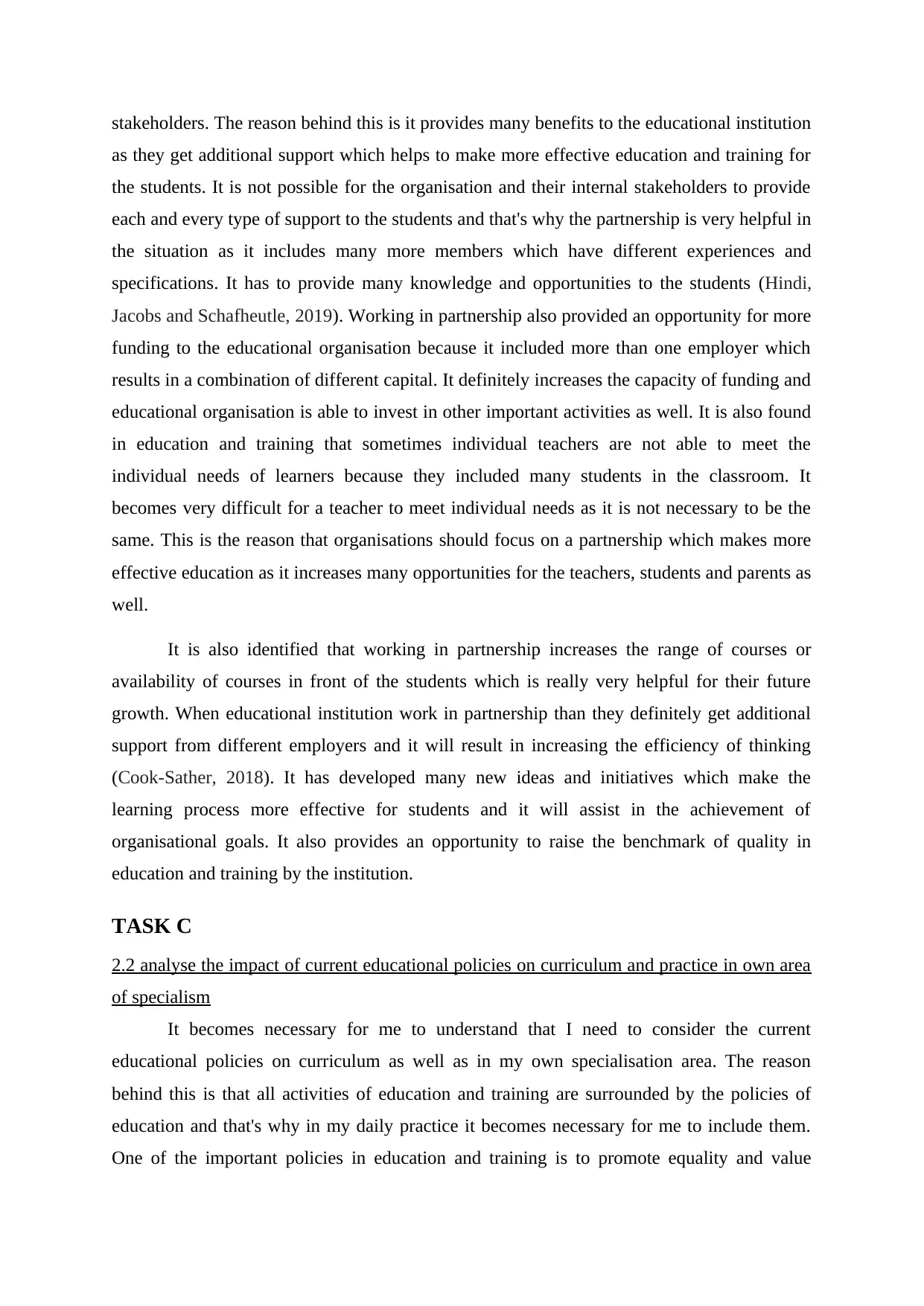
stakeholders. The reason behind this is it provides many benefits to the educational institution
as they get additional support which helps to make more effective education and training for
the students. It is not possible for the organisation and their internal stakeholders to provide
each and every type of support to the students and that's why the partnership is very helpful in
the situation as it includes many more members which have different experiences and
specifications. It has to provide many knowledge and opportunities to the students (Hindi,
Jacobs and Schafheutle, 2019). Working in partnership also provided an opportunity for more
funding to the educational organisation because it included more than one employer which
results in a combination of different capital. It definitely increases the capacity of funding and
educational organisation is able to invest in other important activities as well. It is also found
in education and training that sometimes individual teachers are not able to meet the
individual needs of learners because they included many students in the classroom. It
becomes very difficult for a teacher to meet individual needs as it is not necessary to be the
same. This is the reason that organisations should focus on a partnership which makes more
effective education as it increases many opportunities for the teachers, students and parents as
well.
It is also identified that working in partnership increases the range of courses or
availability of courses in front of the students which is really very helpful for their future
growth. When educational institution work in partnership than they definitely get additional
support from different employers and it will result in increasing the efficiency of thinking
(Cook-Sather, 2018). It has developed many new ideas and initiatives which make the
learning process more effective for students and it will assist in the achievement of
organisational goals. It also provides an opportunity to raise the benchmark of quality in
education and training by the institution.
TASK C
2.2 analyse the impact of current educational policies on curriculum and practice in own area
of specialism
It becomes necessary for me to understand that I need to consider the current
educational policies on curriculum as well as in my own specialisation area. The reason
behind this is that all activities of education and training are surrounded by the policies of
education and that's why in my daily practice it becomes necessary for me to include them.
One of the important policies in education and training is to promote equality and value
as they get additional support which helps to make more effective education and training for
the students. It is not possible for the organisation and their internal stakeholders to provide
each and every type of support to the students and that's why the partnership is very helpful in
the situation as it includes many more members which have different experiences and
specifications. It has to provide many knowledge and opportunities to the students (Hindi,
Jacobs and Schafheutle, 2019). Working in partnership also provided an opportunity for more
funding to the educational organisation because it included more than one employer which
results in a combination of different capital. It definitely increases the capacity of funding and
educational organisation is able to invest in other important activities as well. It is also found
in education and training that sometimes individual teachers are not able to meet the
individual needs of learners because they included many students in the classroom. It
becomes very difficult for a teacher to meet individual needs as it is not necessary to be the
same. This is the reason that organisations should focus on a partnership which makes more
effective education as it increases many opportunities for the teachers, students and parents as
well.
It is also identified that working in partnership increases the range of courses or
availability of courses in front of the students which is really very helpful for their future
growth. When educational institution work in partnership than they definitely get additional
support from different employers and it will result in increasing the efficiency of thinking
(Cook-Sather, 2018). It has developed many new ideas and initiatives which make the
learning process more effective for students and it will assist in the achievement of
organisational goals. It also provides an opportunity to raise the benchmark of quality in
education and training by the institution.
TASK C
2.2 analyse the impact of current educational policies on curriculum and practice in own area
of specialism
It becomes necessary for me to understand that I need to consider the current
educational policies on curriculum as well as in my own specialisation area. The reason
behind this is that all activities of education and training are surrounded by the policies of
education and that's why in my daily practice it becomes necessary for me to include them.
One of the important policies in education and training is to promote equality and value
⊘ This is a preview!⊘
Do you want full access?
Subscribe today to unlock all pages.

Trusted by 1+ million students worldwide
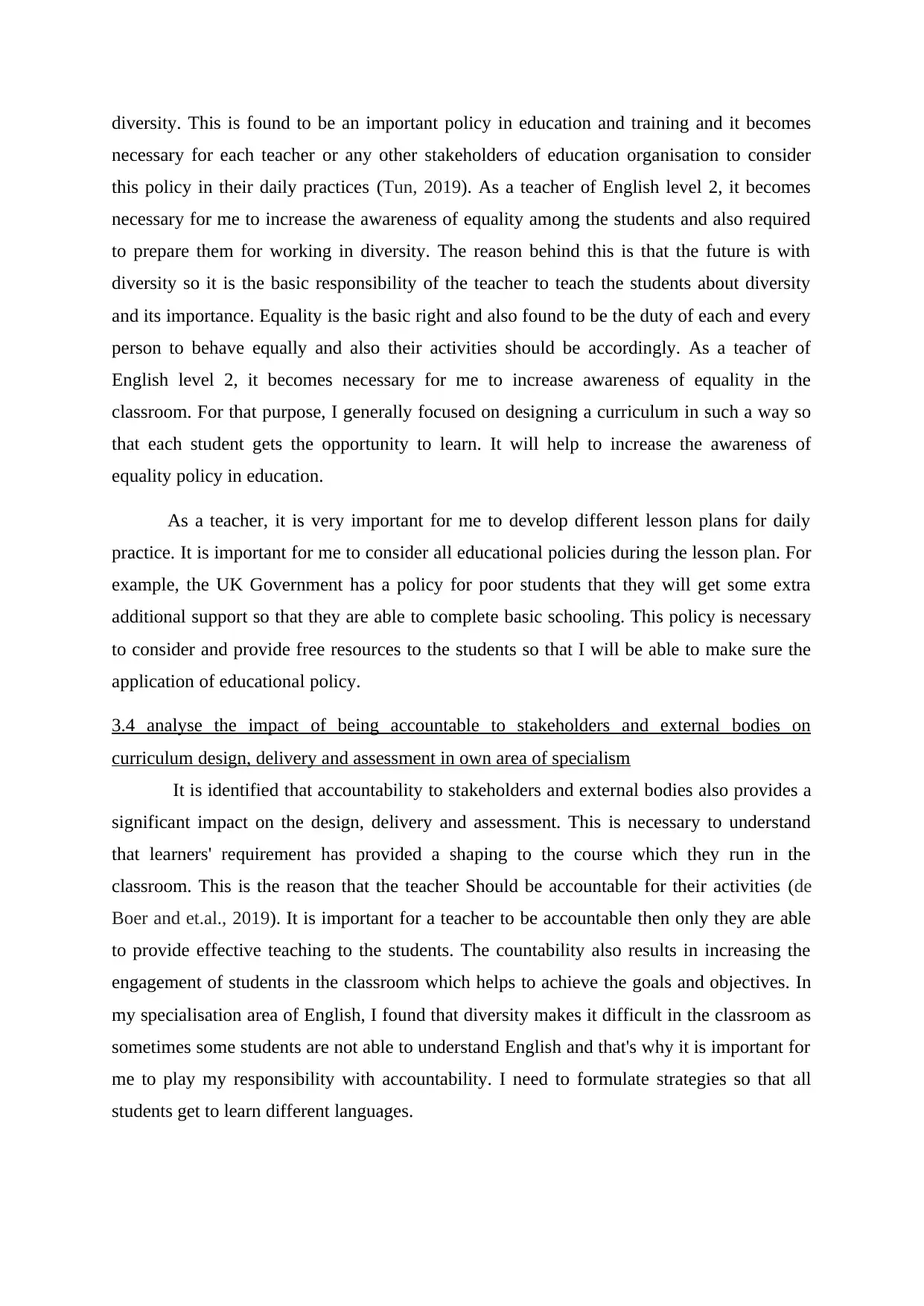
diversity. This is found to be an important policy in education and training and it becomes
necessary for each teacher or any other stakeholders of education organisation to consider
this policy in their daily practices (Tun, 2019). As a teacher of English level 2, it becomes
necessary for me to increase the awareness of equality among the students and also required
to prepare them for working in diversity. The reason behind this is that the future is with
diversity so it is the basic responsibility of the teacher to teach the students about diversity
and its importance. Equality is the basic right and also found to be the duty of each and every
person to behave equally and also their activities should be accordingly. As a teacher of
English level 2, it becomes necessary for me to increase awareness of equality in the
classroom. For that purpose, I generally focused on designing a curriculum in such a way so
that each student gets the opportunity to learn. It will help to increase the awareness of
equality policy in education.
As a teacher, it is very important for me to develop different lesson plans for daily
practice. It is important for me to consider all educational policies during the lesson plan. For
example, the UK Government has a policy for poor students that they will get some extra
additional support so that they are able to complete basic schooling. This policy is necessary
to consider and provide free resources to the students so that I will be able to make sure the
application of educational policy.
3.4 analyse the impact of being accountable to stakeholders and external bodies on
curriculum design, delivery and assessment in own area of specialism
It is identified that accountability to stakeholders and external bodies also provides a
significant impact on the design, delivery and assessment. This is necessary to understand
that learners' requirement has provided a shaping to the course which they run in the
classroom. This is the reason that the teacher Should be accountable for their activities (de
Boer and et.al., 2019). It is important for a teacher to be accountable then only they are able
to provide effective teaching to the students. The countability also results in increasing the
engagement of students in the classroom which helps to achieve the goals and objectives. In
my specialisation area of English, I found that diversity makes it difficult in the classroom as
sometimes some students are not able to understand English and that's why it is important for
me to play my responsibility with accountability. I need to formulate strategies so that all
students get to learn different languages.
necessary for each teacher or any other stakeholders of education organisation to consider
this policy in their daily practices (Tun, 2019). As a teacher of English level 2, it becomes
necessary for me to increase the awareness of equality among the students and also required
to prepare them for working in diversity. The reason behind this is that the future is with
diversity so it is the basic responsibility of the teacher to teach the students about diversity
and its importance. Equality is the basic right and also found to be the duty of each and every
person to behave equally and also their activities should be accordingly. As a teacher of
English level 2, it becomes necessary for me to increase awareness of equality in the
classroom. For that purpose, I generally focused on designing a curriculum in such a way so
that each student gets the opportunity to learn. It will help to increase the awareness of
equality policy in education.
As a teacher, it is very important for me to develop different lesson plans for daily
practice. It is important for me to consider all educational policies during the lesson plan. For
example, the UK Government has a policy for poor students that they will get some extra
additional support so that they are able to complete basic schooling. This policy is necessary
to consider and provide free resources to the students so that I will be able to make sure the
application of educational policy.
3.4 analyse the impact of being accountable to stakeholders and external bodies on
curriculum design, delivery and assessment in own area of specialism
It is identified that accountability to stakeholders and external bodies also provides a
significant impact on the design, delivery and assessment. This is necessary to understand
that learners' requirement has provided a shaping to the course which they run in the
classroom. This is the reason that the teacher Should be accountable for their activities (de
Boer and et.al., 2019). It is important for a teacher to be accountable then only they are able
to provide effective teaching to the students. The countability also results in increasing the
engagement of students in the classroom which helps to achieve the goals and objectives. In
my specialisation area of English, I found that diversity makes it difficult in the classroom as
sometimes some students are not able to understand English and that's why it is important for
me to play my responsibility with accountability. I need to formulate strategies so that all
students get to learn different languages.
Paraphrase This Document
Need a fresh take? Get an instant paraphrase of this document with our AI Paraphraser
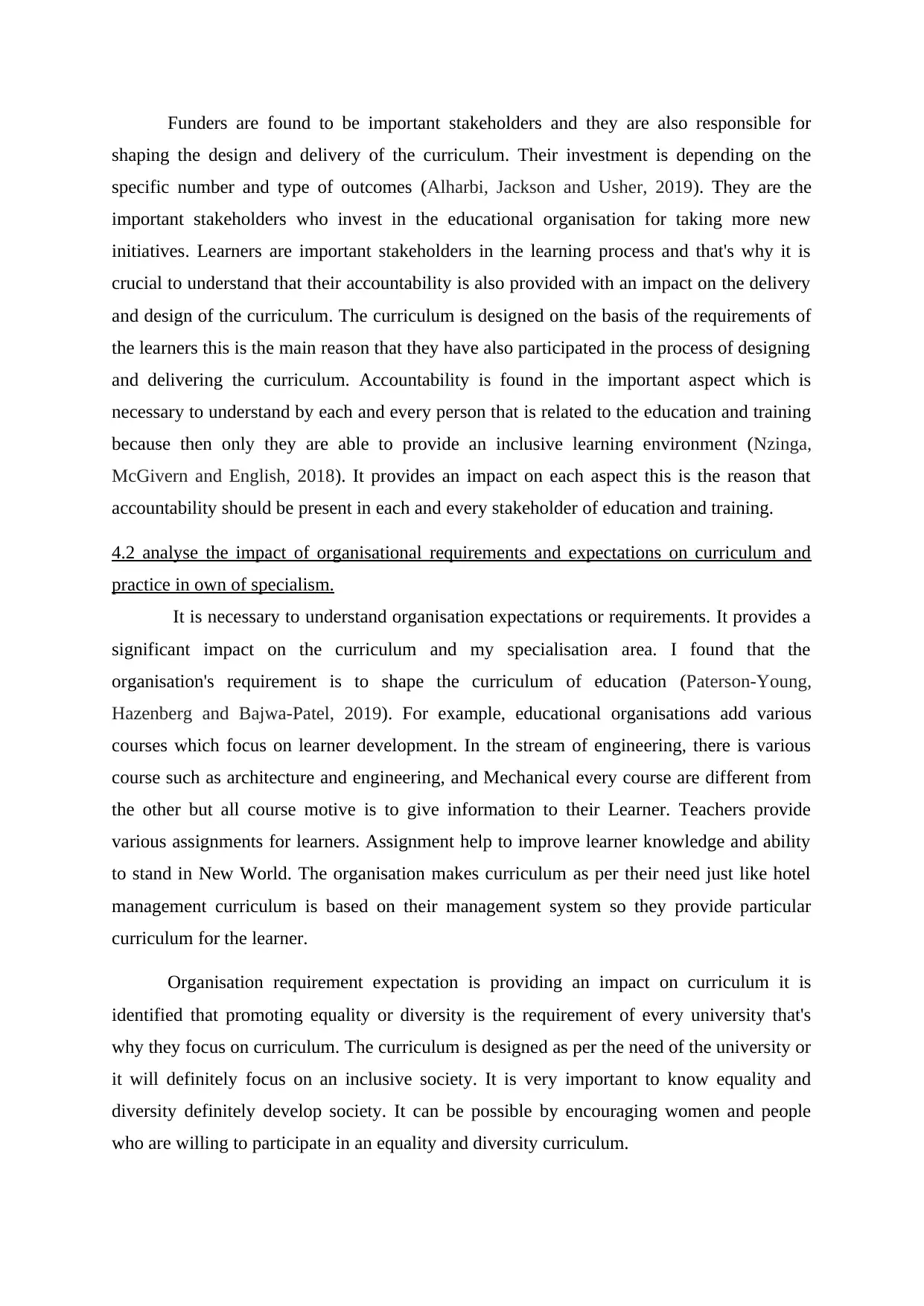
Funders are found to be important stakeholders and they are also responsible for
shaping the design and delivery of the curriculum. Their investment is depending on the
specific number and type of outcomes (Alharbi, Jackson and Usher, 2019). They are the
important stakeholders who invest in the educational organisation for taking more new
initiatives. Learners are important stakeholders in the learning process and that's why it is
crucial to understand that their accountability is also provided with an impact on the delivery
and design of the curriculum. The curriculum is designed on the basis of the requirements of
the learners this is the main reason that they have also participated in the process of designing
and delivering the curriculum. Accountability is found in the important aspect which is
necessary to understand by each and every person that is related to the education and training
because then only they are able to provide an inclusive learning environment (Nzinga,
McGivern and English, 2018). It provides an impact on each aspect this is the reason that
accountability should be present in each and every stakeholder of education and training.
4.2 analyse the impact of organisational requirements and expectations on curriculum and
practice in own of specialism.
It is necessary to understand organisation expectations or requirements. It provides a
significant impact on the curriculum and my specialisation area. I found that the
organisation's requirement is to shape the curriculum of education (Paterson-Young,
Hazenberg and Bajwa-Patel, 2019). For example, educational organisations add various
courses which focus on learner development. In the stream of engineering, there is various
course such as architecture and engineering, and Mechanical every course are different from
the other but all course motive is to give information to their Learner. Teachers provide
various assignments for learners. Assignment help to improve learner knowledge and ability
to stand in New World. The organisation makes curriculum as per their need just like hotel
management curriculum is based on their management system so they provide particular
curriculum for the learner.
Organisation requirement expectation is providing an impact on curriculum it is
identified that promoting equality or diversity is the requirement of every university that's
why they focus on curriculum. The curriculum is designed as per the need of the university or
it will definitely focus on an inclusive society. It is very important to know equality and
diversity definitely develop society. It can be possible by encouraging women and people
who are willing to participate in an equality and diversity curriculum.
shaping the design and delivery of the curriculum. Their investment is depending on the
specific number and type of outcomes (Alharbi, Jackson and Usher, 2019). They are the
important stakeholders who invest in the educational organisation for taking more new
initiatives. Learners are important stakeholders in the learning process and that's why it is
crucial to understand that their accountability is also provided with an impact on the delivery
and design of the curriculum. The curriculum is designed on the basis of the requirements of
the learners this is the main reason that they have also participated in the process of designing
and delivering the curriculum. Accountability is found in the important aspect which is
necessary to understand by each and every person that is related to the education and training
because then only they are able to provide an inclusive learning environment (Nzinga,
McGivern and English, 2018). It provides an impact on each aspect this is the reason that
accountability should be present in each and every stakeholder of education and training.
4.2 analyse the impact of organisational requirements and expectations on curriculum and
practice in own of specialism.
It is necessary to understand organisation expectations or requirements. It provides a
significant impact on the curriculum and my specialisation area. I found that the
organisation's requirement is to shape the curriculum of education (Paterson-Young,
Hazenberg and Bajwa-Patel, 2019). For example, educational organisations add various
courses which focus on learner development. In the stream of engineering, there is various
course such as architecture and engineering, and Mechanical every course are different from
the other but all course motive is to give information to their Learner. Teachers provide
various assignments for learners. Assignment help to improve learner knowledge and ability
to stand in New World. The organisation makes curriculum as per their need just like hotel
management curriculum is based on their management system so they provide particular
curriculum for the learner.
Organisation requirement expectation is providing an impact on curriculum it is
identified that promoting equality or diversity is the requirement of every university that's
why they focus on curriculum. The curriculum is designed as per the need of the university or
it will definitely focus on an inclusive society. It is very important to know equality and
diversity definitely develop society. It can be possible by encouraging women and people
who are willing to participate in an equality and diversity curriculum.
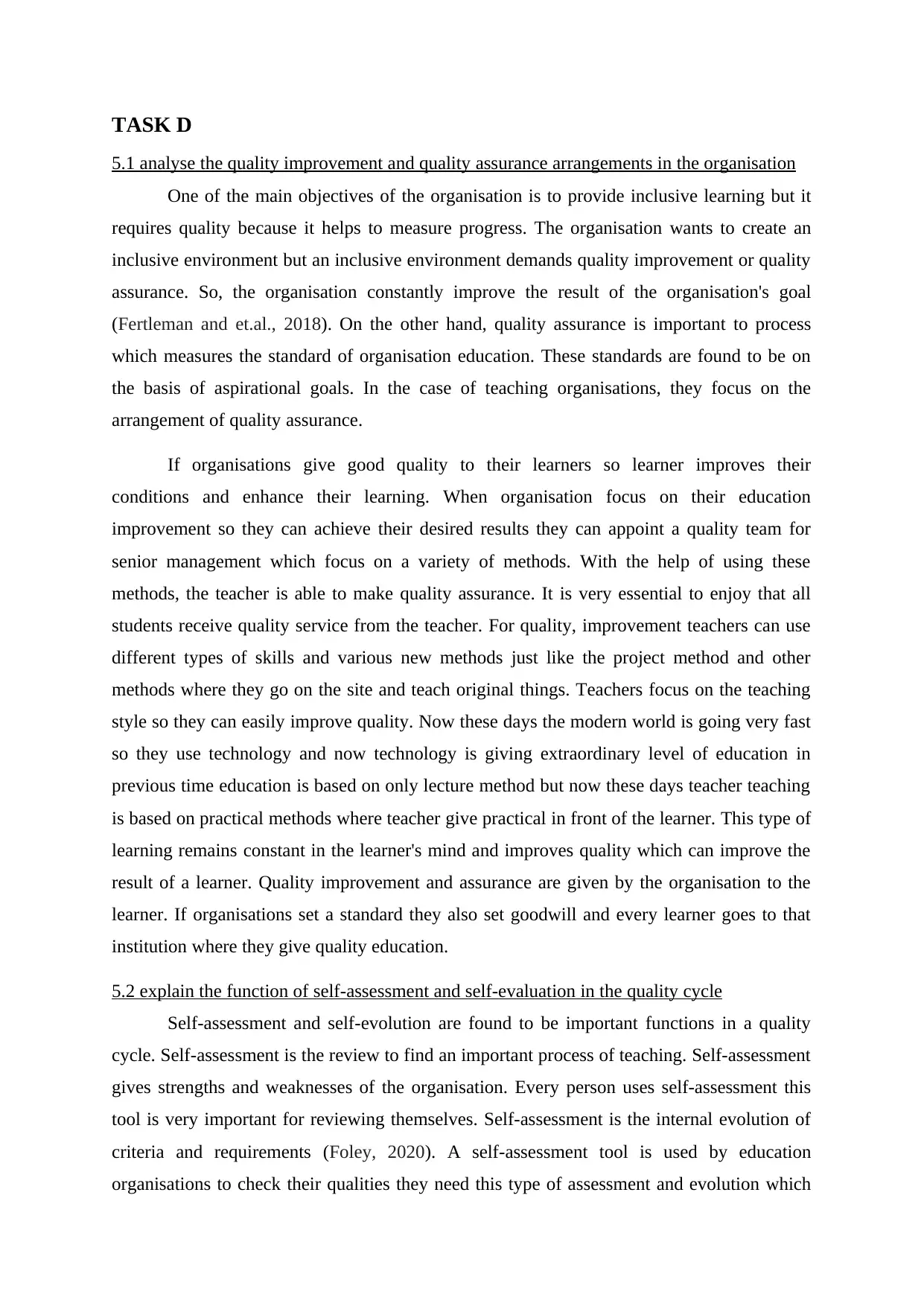
TASK D
5.1 analyse the quality improvement and quality assurance arrangements in the organisation
One of the main objectives of the organisation is to provide inclusive learning but it
requires quality because it helps to measure progress. The organisation wants to create an
inclusive environment but an inclusive environment demands quality improvement or quality
assurance. So, the organisation constantly improve the result of the organisation's goal
(Fertleman and et.al., 2018). On the other hand, quality assurance is important to process
which measures the standard of organisation education. These standards are found to be on
the basis of aspirational goals. In the case of teaching organisations, they focus on the
arrangement of quality assurance.
If organisations give good quality to their learners so learner improves their
conditions and enhance their learning. When organisation focus on their education
improvement so they can achieve their desired results they can appoint a quality team for
senior management which focus on a variety of methods. With the help of using these
methods, the teacher is able to make quality assurance. It is very essential to enjoy that all
students receive quality service from the teacher. For quality, improvement teachers can use
different types of skills and various new methods just like the project method and other
methods where they go on the site and teach original things. Teachers focus on the teaching
style so they can easily improve quality. Now these days the modern world is going very fast
so they use technology and now technology is giving extraordinary level of education in
previous time education is based on only lecture method but now these days teacher teaching
is based on practical methods where teacher give practical in front of the learner. This type of
learning remains constant in the learner's mind and improves quality which can improve the
result of a learner. Quality improvement and assurance are given by the organisation to the
learner. If organisations set a standard they also set goodwill and every learner goes to that
institution where they give quality education.
5.2 explain the function of self-assessment and self-evaluation in the quality cycle
Self-assessment and self-evolution are found to be important functions in a quality
cycle. Self-assessment is the review to find an important process of teaching. Self-assessment
gives strengths and weaknesses of the organisation. Every person uses self-assessment this
tool is very important for reviewing themselves. Self-assessment is the internal evolution of
criteria and requirements (Foley, 2020). A self-assessment tool is used by education
organisations to check their qualities they need this type of assessment and evolution which
5.1 analyse the quality improvement and quality assurance arrangements in the organisation
One of the main objectives of the organisation is to provide inclusive learning but it
requires quality because it helps to measure progress. The organisation wants to create an
inclusive environment but an inclusive environment demands quality improvement or quality
assurance. So, the organisation constantly improve the result of the organisation's goal
(Fertleman and et.al., 2018). On the other hand, quality assurance is important to process
which measures the standard of organisation education. These standards are found to be on
the basis of aspirational goals. In the case of teaching organisations, they focus on the
arrangement of quality assurance.
If organisations give good quality to their learners so learner improves their
conditions and enhance their learning. When organisation focus on their education
improvement so they can achieve their desired results they can appoint a quality team for
senior management which focus on a variety of methods. With the help of using these
methods, the teacher is able to make quality assurance. It is very essential to enjoy that all
students receive quality service from the teacher. For quality, improvement teachers can use
different types of skills and various new methods just like the project method and other
methods where they go on the site and teach original things. Teachers focus on the teaching
style so they can easily improve quality. Now these days the modern world is going very fast
so they use technology and now technology is giving extraordinary level of education in
previous time education is based on only lecture method but now these days teacher teaching
is based on practical methods where teacher give practical in front of the learner. This type of
learning remains constant in the learner's mind and improves quality which can improve the
result of a learner. Quality improvement and assurance are given by the organisation to the
learner. If organisations set a standard they also set goodwill and every learner goes to that
institution where they give quality education.
5.2 explain the function of self-assessment and self-evaluation in the quality cycle
Self-assessment and self-evolution are found to be important functions in a quality
cycle. Self-assessment is the review to find an important process of teaching. Self-assessment
gives strengths and weaknesses of the organisation. Every person uses self-assessment this
tool is very important for reviewing themselves. Self-assessment is the internal evolution of
criteria and requirements (Foley, 2020). A self-assessment tool is used by education
organisations to check their qualities they need this type of assessment and evolution which
⊘ This is a preview!⊘
Do you want full access?
Subscribe today to unlock all pages.

Trusted by 1+ million students worldwide
1 out of 17
Related Documents
Your All-in-One AI-Powered Toolkit for Academic Success.
+13062052269
info@desklib.com
Available 24*7 on WhatsApp / Email
![[object Object]](/_next/static/media/star-bottom.7253800d.svg)
Unlock your academic potential
Copyright © 2020–2026 A2Z Services. All Rights Reserved. Developed and managed by ZUCOL.


